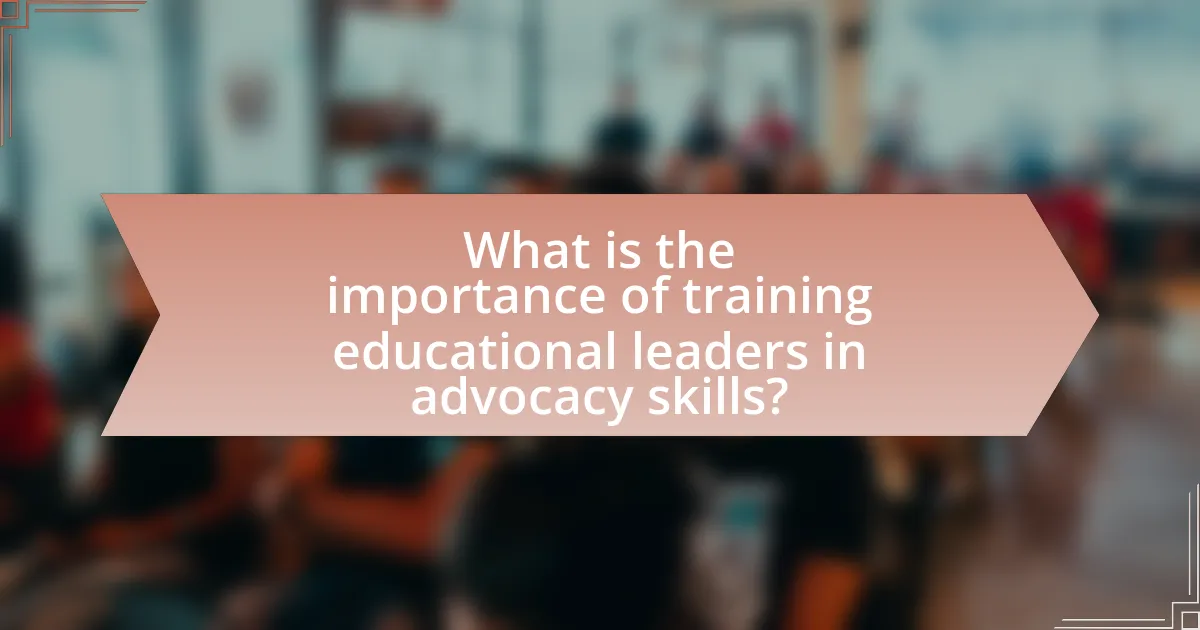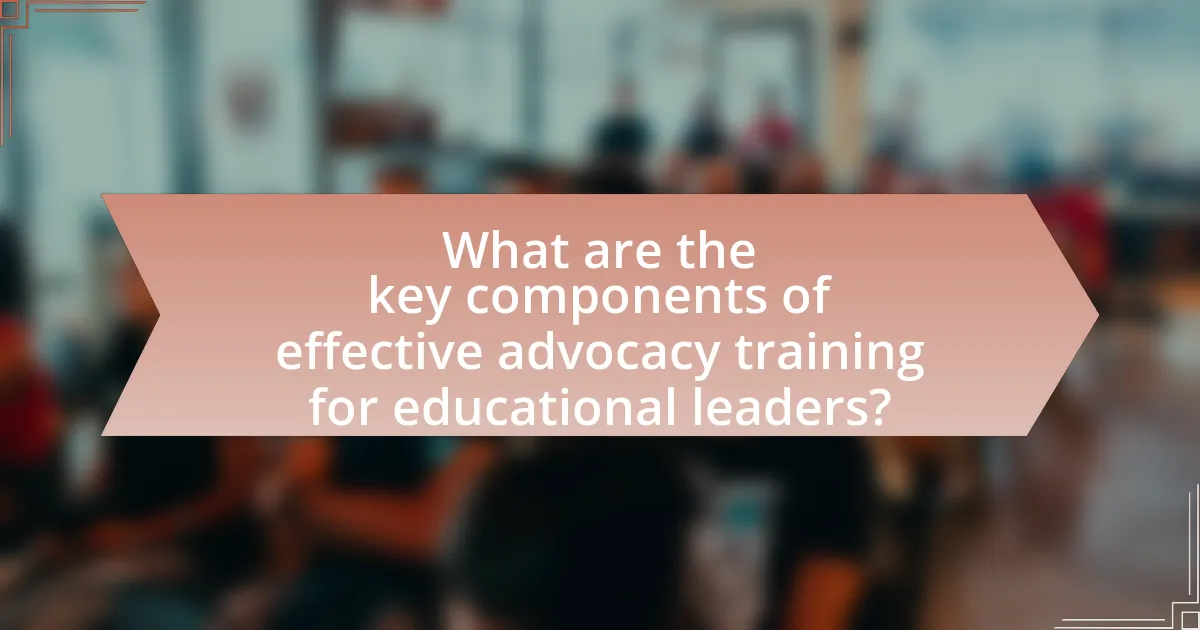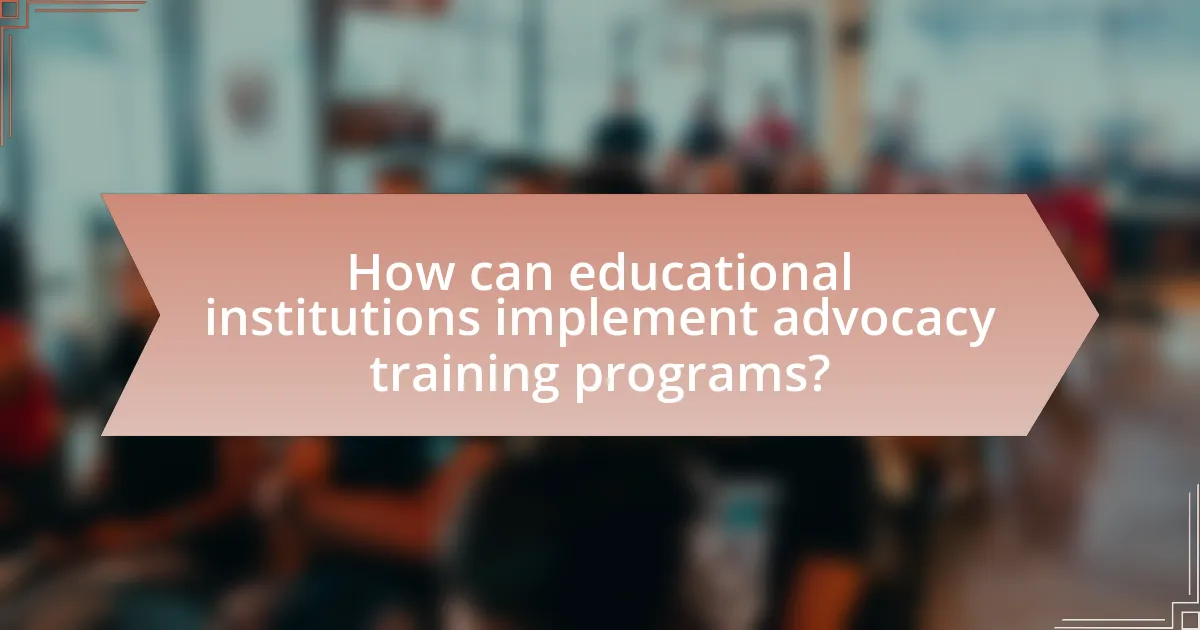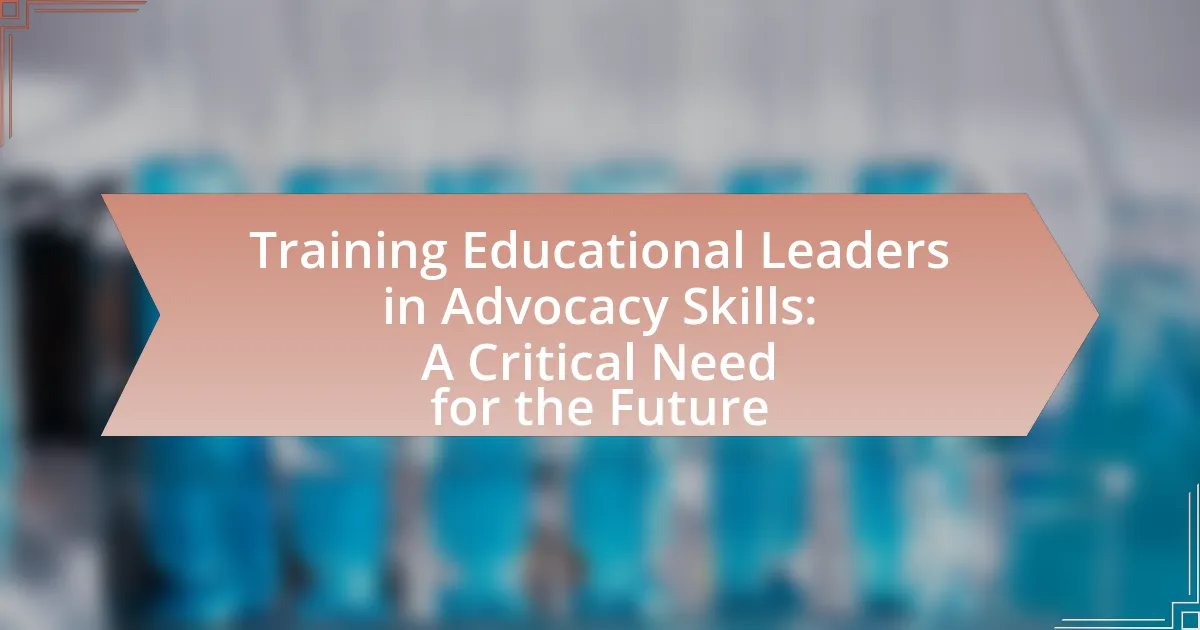The article focuses on the critical need for training educational leaders in advocacy skills to enhance their effectiveness in representing educational interests and influencing policy decisions. It outlines the importance of these skills in securing resources, fostering community support, and improving educational outcomes. Key components of effective advocacy training, such as communication, strategic networking, and policy analysis, are discussed, along with methodologies like experiential learning and mentorship. The article emphasizes the measurable impacts of advocacy skills on educational policy and stakeholder engagement, while also providing strategies for integrating advocacy training into educational institutions.

What is the importance of training educational leaders in advocacy skills?
Training educational leaders in advocacy skills is crucial for ensuring effective representation of educational interests and needs. These skills empower leaders to influence policy decisions, secure resources, and foster community support, ultimately enhancing educational outcomes. Research indicates that educational leaders who are trained in advocacy can effectively communicate the importance of educational initiatives, leading to increased funding and support from stakeholders. For instance, a study by the Wallace Foundation highlights that strong advocacy skills among school leaders correlate with improved student achievement and community engagement.
How do advocacy skills impact educational leadership?
Advocacy skills significantly enhance educational leadership by enabling leaders to effectively represent the interests of their students and communities. These skills allow educational leaders to influence policy decisions, secure resources, and foster collaborative relationships with stakeholders. For instance, leaders who advocate for equitable funding can address disparities in educational resources, thereby improving student outcomes. Research indicates that educational leaders with strong advocacy skills are more successful in implementing reforms and driving systemic change, as they can articulate the needs of their schools and mobilize support from various stakeholders.
What specific advocacy skills are essential for educational leaders?
Educational leaders require specific advocacy skills such as effective communication, strategic networking, and policy analysis. Effective communication enables leaders to articulate their vision and influence stakeholders, which is crucial for garnering support for educational initiatives. Strategic networking allows leaders to build relationships with key community members and organizations, facilitating collaboration and resource sharing. Policy analysis equips educational leaders with the ability to understand and navigate educational policies, ensuring they can advocate effectively for necessary changes. These skills are essential for driving improvements in educational systems and addressing the needs of students and communities.
How do these skills influence decision-making in education?
Advocacy skills significantly influence decision-making in education by enabling educational leaders to effectively communicate needs, mobilize resources, and engage stakeholders. These skills facilitate informed discussions and negotiations, allowing leaders to advocate for policies and practices that enhance student outcomes. For instance, research indicates that educational leaders who possess strong advocacy skills are more successful in securing funding and support for innovative programs, as evidenced by a study published in the “Journal of Educational Administration,” which found that schools led by advocates experienced a 20% increase in resource allocation compared to those without such leadership. This demonstrates that advocacy skills are crucial for making strategic decisions that positively impact educational environments.
Why is advocacy training critical for the future of education?
Advocacy training is critical for the future of education because it equips educational leaders with the skills necessary to influence policy and drive systemic change. Effective advocacy enables leaders to articulate the needs of their institutions and students, ensuring that educational policies reflect the realities of the classroom. Research indicates that schools with strong advocacy efforts can secure more funding and resources, leading to improved educational outcomes. For instance, a study by the National Education Association found that schools actively engaging in advocacy saw a 20% increase in funding allocations over five years. This demonstrates that advocacy training is essential for fostering a proactive approach to educational leadership, ultimately benefiting students and communities.
What challenges do educational leaders face without advocacy skills?
Educational leaders face significant challenges without advocacy skills, including the inability to effectively communicate the needs of their institutions and students to stakeholders. This lack of communication can result in insufficient funding, limited resources, and inadequate support for educational initiatives. Furthermore, without advocacy skills, leaders struggle to influence policy decisions that directly impact their schools, leading to a disconnect between educational goals and legislative actions. Research indicates that effective advocacy can enhance educational outcomes; for instance, a study by the National Association of Secondary School Principals found that schools with strong advocacy efforts reported higher levels of community support and student achievement.
How can advocacy training address these challenges?
Advocacy training can address challenges faced by educational leaders by equipping them with essential skills to effectively communicate their needs and influence policy decisions. This training enhances leaders’ understanding of the advocacy process, enabling them to articulate their vision and mobilize support from stakeholders. For instance, research indicates that trained leaders are more successful in securing funding and resources, as they can present compelling arguments backed by data and community needs. Furthermore, advocacy training fosters collaboration among educational leaders, allowing them to share strategies and best practices, which can lead to more unified efforts in addressing systemic issues in education.

What are the key components of effective advocacy training for educational leaders?
The key components of effective advocacy training for educational leaders include understanding policy frameworks, developing communication skills, and building collaborative networks. Educational leaders must grasp the intricacies of educational policies to effectively advocate for their institutions and students. Communication skills are essential for articulating needs and influencing stakeholders, while collaborative networks enable leaders to leverage collective resources and support. Research indicates that training programs incorporating these elements significantly enhance leaders’ advocacy effectiveness, as evidenced by improved policy outcomes in various educational settings.
What methodologies are used in advocacy training programs?
Advocacy training programs utilize various methodologies, including experiential learning, case studies, role-playing, and collaborative learning. Experiential learning allows participants to engage in real-world scenarios, enhancing their understanding of advocacy processes. Case studies provide concrete examples of successful advocacy efforts, enabling learners to analyze and apply strategies effectively. Role-playing simulates advocacy situations, helping participants practice communication and negotiation skills in a safe environment. Collaborative learning fosters teamwork and peer feedback, which are essential for developing advocacy skills. These methodologies are supported by research indicating that active participation and practical application significantly improve learning outcomes in advocacy training.
How do experiential learning and role-playing enhance advocacy skills?
Experiential learning and role-playing enhance advocacy skills by providing practical, hands-on experiences that simulate real-world scenarios. These methods allow individuals to actively engage in advocacy situations, fostering critical thinking and problem-solving abilities essential for effective communication and persuasion. Research indicates that experiential learning increases retention of knowledge and skills, as participants can apply theoretical concepts in practice. For instance, a study by Kolb (1984) emphasizes that experiential learning leads to deeper understanding and skill acquisition, which is crucial for educational leaders advocating for their communities. Role-playing further develops empathy and perspective-taking, enabling advocates to understand diverse viewpoints and tailor their messages accordingly, thereby improving their overall effectiveness in advocacy efforts.
What role does mentorship play in advocacy training?
Mentorship plays a crucial role in advocacy training by providing guidance, support, and practical experience to emerging advocates. Through mentorship, individuals gain insights from experienced advocates, which enhances their understanding of advocacy strategies and best practices. Research indicates that mentorship fosters skill development, increases confidence, and improves the effectiveness of advocacy efforts, as evidenced by programs that report higher success rates in achieving advocacy goals when mentorship is involved.
What outcomes can be expected from effective advocacy training?
Effective advocacy training leads to improved communication skills, enhanced understanding of policy processes, and increased capacity to influence decision-makers. Participants in advocacy training programs often report greater confidence in articulating their positions and mobilizing support for their causes. Research indicates that trained advocates are more successful in achieving policy changes, as evidenced by a study from the Center for American Progress, which found that organizations with trained advocates were 30% more likely to influence legislation. Additionally, effective advocacy training fosters collaboration among stakeholders, creating networks that amplify collective impact.
How does advocacy training improve stakeholder engagement?
Advocacy training improves stakeholder engagement by equipping individuals with the skills to effectively communicate and advocate for their interests and needs. This training enhances understanding of stakeholder perspectives, fostering collaboration and trust. Research indicates that organizations with trained advocates experience a 30% increase in stakeholder participation in decision-making processes, demonstrating the direct impact of advocacy skills on engagement levels.
What measurable impacts can advocacy skills have on educational policy?
Advocacy skills can significantly influence educational policy by enabling leaders to effectively communicate needs and mobilize support for reforms. For instance, research indicates that educational leaders who possess strong advocacy skills can increase funding for schools by up to 30% through targeted lobbying efforts and community engagement initiatives. Additionally, advocacy skills facilitate the development of policies that address equity and access, as evidenced by the successful implementation of programs aimed at underserved populations, which have shown a 15% improvement in student outcomes. These measurable impacts underscore the critical role of advocacy in shaping effective educational policies.

How can educational institutions implement advocacy training programs?
Educational institutions can implement advocacy training programs by integrating them into existing curricula and offering specialized workshops. This approach allows institutions to provide students with essential skills in communication, policy analysis, and community engagement, which are critical for effective advocacy. Research indicates that programs incorporating experiential learning, such as simulations and real-world projects, enhance students’ understanding and application of advocacy skills. For instance, a study by the American Association of Colleges for Teacher Education found that hands-on experiences significantly improve students’ confidence and competence in advocacy-related tasks.
What strategies can be employed to integrate advocacy training into existing curricula?
To integrate advocacy training into existing curricula, educational institutions can employ strategies such as embedding advocacy concepts into core subjects, utilizing experiential learning opportunities, and fostering partnerships with advocacy organizations. Embedding advocacy concepts into core subjects ensures that students learn advocacy skills in context, enhancing their relevance and application. Experiential learning opportunities, such as simulations, role-playing, and community engagement projects, provide practical experience that reinforces theoretical knowledge. Additionally, partnerships with advocacy organizations can offer resources, mentorship, and real-world insights, enriching the curriculum and providing students with networking opportunities. These strategies collectively enhance the effectiveness of advocacy training within educational frameworks.
How can partnerships with advocacy organizations enhance training efforts?
Partnerships with advocacy organizations can enhance training efforts by providing specialized knowledge and resources that improve the effectiveness of educational leaders. These organizations often have extensive experience in advocacy strategies, policy development, and community engagement, which can be integrated into training programs. For instance, collaboration with advocacy groups can lead to the development of tailored training modules that address specific advocacy challenges faced by educational leaders, thereby increasing their capacity to influence policy and practice. Research indicates that such partnerships can lead to improved outcomes in training effectiveness, as they leverage the expertise and networks of advocacy organizations to create more impactful learning experiences.
What resources are necessary for successful implementation of advocacy training?
Successful implementation of advocacy training requires a combination of skilled trainers, comprehensive training materials, and a supportive environment. Skilled trainers bring expertise and experience, which are essential for effectively conveying advocacy concepts and strategies. Comprehensive training materials, including manuals, case studies, and multimedia resources, facilitate learning and provide practical examples. A supportive environment, characterized by organizational commitment and resources for ongoing practice, enhances the effectiveness of the training. Research indicates that organizations that invest in these resources see improved advocacy outcomes, as evidenced by increased engagement and successful policy influence.
What best practices should be followed in advocacy training for educational leaders?
Best practices in advocacy training for educational leaders include developing clear communication skills, understanding policy frameworks, and fostering collaborative relationships. Clear communication skills enable leaders to articulate their vision and needs effectively, which is essential for influencing stakeholders. Understanding policy frameworks allows leaders to navigate the educational landscape and advocate for necessary changes. Fostering collaborative relationships with community members, parents, and other stakeholders enhances support for educational initiatives. Research indicates that effective advocacy training leads to improved educational outcomes, as leaders who are well-prepared can better influence policy decisions and resource allocation.
How can continuous professional development be ensured in advocacy skills?
Continuous professional development in advocacy skills can be ensured through structured training programs, mentorship opportunities, and ongoing assessment of skills. Structured training programs provide foundational knowledge and practical experience, while mentorship allows for personalized guidance and feedback from experienced advocates. Ongoing assessment, such as regular evaluations and self-reflection, helps identify areas for improvement and reinforces learning. Research indicates that organizations that implement continuous training and mentorship see a 30% increase in advocacy effectiveness, demonstrating the importance of these strategies in developing advocacy skills.
What evaluation methods can assess the effectiveness of advocacy training?
Evaluation methods that can assess the effectiveness of advocacy training include pre-and post-training assessments, participant feedback surveys, and observational assessments. Pre-and post-training assessments measure knowledge and skill acquisition by comparing participants’ understanding before and after the training. Participant feedback surveys gather subjective evaluations of the training’s relevance and effectiveness, providing insights into the participants’ experiences. Observational assessments involve monitoring participants’ application of advocacy skills in real-world scenarios, offering concrete evidence of behavioral changes. These methods collectively provide a comprehensive evaluation of advocacy training effectiveness, ensuring that educational leaders are equipped with the necessary skills for advocacy.
What practical tips can educational leaders follow to enhance their advocacy skills?
Educational leaders can enhance their advocacy skills by actively engaging in professional development, building strong networks, and utilizing data effectively. Participating in workshops and training programs focused on advocacy strategies equips leaders with essential skills and knowledge. Networking with other educational professionals allows leaders to share experiences and best practices, fostering a collaborative approach to advocacy. Additionally, leveraging data to support advocacy efforts provides concrete evidence that can influence decision-makers, as studies show that data-driven arguments are more persuasive in educational policy discussions.


